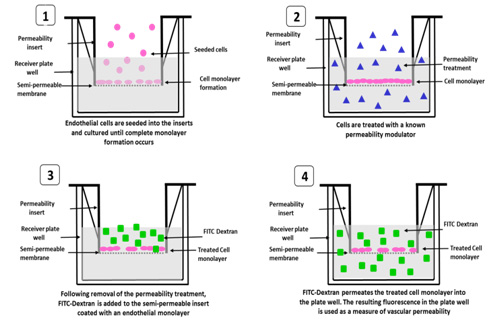The vascular barrier is essential to maintain the selective permeability, which is important for proper organ development and performance and its dysfunction is involved in several diseases. Endothelial cell lining of the internal vasculature forms a semi-permeable barrier that is essential in selective transport between the blood and the interstitial spaces of the body. An adequate permeability barrier function is governed by cell-cell, cell-extracellular matrix contacts and inflammatory factors. Disruption of the endothelial cell barrier can result in increased permeability and vascular leakage, which is associated with many systemic diseases and pathological angiogenic diseases. The studies of the underlying molecular mechanisms require multidisciplinary method. Here, Creative Bioarray establish a method to measure vessel permeability in vitro.
This vitro vascular permeability assay is performed in a 24-well tissue cultured plate. The plate contains 12 cell culture inserts with a porous membrane. This porous membrane permit amplified rates of basolateral diffusion with molecules that we are of interest in permeability assays. Before the endothelial cells are seeded, the inserts are precast with collagen. Then, endothelial cells are seeded onto the collagen-coated inserts and form a confluent cell monolayer. The endothelial cell monolayers cultured on this semi-permeable membrane can form adherent and tight junctions, which are accurately reflecting the situation in vivo and important for the study of vascular permeatability. After the cells are incubated for proper time to occlude the membrane pores, the cell monolayer is treated with cytokines, grow factors or other reagent of interest. After treatment, FITC-Dextran is added on top of the cells, which allows it to permeate through the cell monolayer. The extent of permeability can be achieved by measuring the fluorescence of the plat well solution.
 Figure 1. The process of Vascular Permeability Assay
Figure 1. The process of Vascular Permeability Assay
The vascular permeability assay provides an efficient and convenient system to evaluate the effects of chemicals and drugs on endothelial cell adsorption, transport and permeability. This assay is also effective and versatile to study various compounds that influence the permeability of endothelial cells. Thus, with the help of vascular permeability assay, it is more easily and possible to obtain a further understanding of the mechanisms of vascular permeability.

Online Inquiry